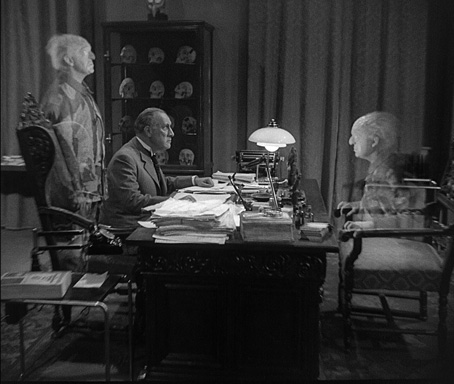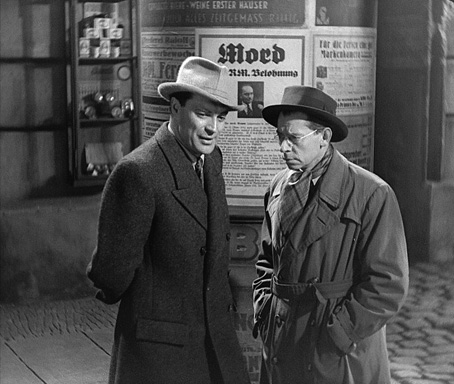|
It may seem an odd decision to release the second part of a celebrated trilogy of films on Blu-ray before the first and third, but while for Masters of Cinema the move was very likely dictated by practical considerations (if you have an HD restoration of one part of a trilogy and not the other two, which do you think is going to get the Blu-ray release?), for me it has a perverse personal logic. You see The Testament of Dr. Mabuse (Das Testament des Dr. Mabuse – an easy translation even for non-German speakers) was the first of the three films that I saw. And it really made an impact on me.
A key thing about The Testament of Dr. Mabuse is that, despite being the middle film of an eventual trilogy, it plays perfectly well as a stand-alone work. You don't need to see the 1922 Dr. Mabuse, der Spieler [Dr. Mabuse, the Gambler] to make sense of The Testament of Dr. Mabuse – a brief but tidy summary of what took place in the earlier film is provided early on by one of the characters – and it won't leave you hanging by a thread until you catch up with the 1960 The 1000 Eyes of Dr. Mabuse [1000 Augens des Mabuse]. Of course, you'll probably get more out of the film if you do watch Dr. Mabuse, der Spieler first (I'd see it anyway, because it really is superb), as you'll then know exactly who Mabuse is and just what he is capable of when his name first comes up. But if you're looking to properly prepare yourself, you should also revisit director Fritz Lang's celebrated crime thriller M, to which The Testament of Dr. Mabuse is also a partial sequel. I hope you're following this.

For me, The Testament of Dr. Mabuse has also become a lifeline to one of those memories that age seems determined to fragment and partially erase, as my brain makes room for new material by discarding what it thinks it no longer needs, leaving me with only the remnants of past events. I do remember that my first viewing of the film was a TV screening and that a couple of weeks later I was in a pub somewhere in conversation with a filmmaker. And I can't for the life of me remember who he was, where the pub was located (it wasn't a local one, and I seem to recall it was some distance from home) or what the hell I was doing there in the first place. I have a vague recollection that it was following some film-related event that the two of us had attended and at which we had very likely met. For the life of me I can't recall what we talked about for the first twenty minutes or so, but clearly remember the point where my drinking companion expressed his belief that modern films were neither as as innovative nor as exciting as those from cinema's earlier days. I was in complete agreement, but asked him for an example. "The Testament of Dr. Mabuse," he eagerly replied. Having seen it only recently (I'm guessing that same TV screening was also responsible for his chosen example), I responded with equal enthusiam, and a lively conversation unfolded about the film's technical and storytelling brilliance.
I'm not sure what it says about me that the only thing that has stayed with me from this encounter was a conversation about a film that I still adore, but unfortunately this is not the only time this has happened. Following a screening of his 1998 feature Painted Angels, I and a number of others joined director Jon Sanders (at least I remembered his name this time) for a drink and a chat in a nearby wine bar, and the only thing I can recall about our conversation was our shared enthusiasm for the films of Mizoguchi Kenji. I'm getting the feeling that my past is going to end up defined more by the films I have seen than the people I have met.
But I digress. The Testament of Dr. Mabuse is out this week as a dual format release from Masters of Cinema, and if you're new to the film then you doubtless want to know why it made such an impact. For an answer to that question I direct you to our 2009 review of Eureka's 3-DVD The Complete Fritz Lang Mabuse Box Set, where you'll find individual reviews of all three of the Mabuse films that were directed by Fritz Lang. For now, the key thing is how the film shapes up on Blu-ray, and whether it's worth the upgrade from the one you'll find in that very fine DVD box set.
The transfer here, like the that on the previous DVD release, was made from a restoration carried out by the German Film Institute (DIF, or Deutsche Filminstitut) in collaboration with the Federal Film Archive, the Munich Film Museum, KirchMedia and ZDF/ARTE. A duplicate positive of the shortened 111-minute version was used as a basis for the restoration due to the damaged state of the original negative, with missing scenes, wherever possible, sourced from prints held by the Federal Film Archive and the Munich Film Institute.

As so often with Masters of Cinema HD upgrades, the new release is handicapped just slightly by the fact that the DVD transfer it supercedes was so good in the first place. Put the DVD and Blu-ray side-by-side and the differences do not immediately leap out, as being sourced from the same transfer, the Blu-ray displays the same instances of print damage as you'll find on its SD predecessor, but also its solid contrast and crisp picture detail. From an early stage, however, the image on the Blu-ray has a sharper and more tonally attractive feel, the increased picture detail visible on textured surfaces and the fine detail of clothing, faces and set-dressing. A good example is the opening shot of chapter 9, where the wall that Inspector Lohmann is seated in front of is covered by a large area map – on the Blu-ray the road network, while not digital-sharp, is clearly visible, while on the DVD the roads merge together into a less distinct blur, a bit like my home town looks when viewed on the satellite mode of Apple's new iOS 6 Maps application. Also brought into sharper focus is the film grain, which is quite pronounced in places, but allowances have to be made for the variable condition of the source material. Overall, this is a very impressive transfer.
The DTS-HD Master Audio 2.0 has some crackle and background hiss (this varies quite a bit, depending on the condition of the film material, varying from quite loud to almost undetectable) and the expected narrow dynamic range, but the dialogue is always clearly reproduced and teh track is certainly louder than the Dolby 2.0 of the DVD.
Commentary
Film scholar and author David Kalat takes us through the film and the background to its production in enthralling detail. Areas covered, often in some depth, include the film's political commentary and how this has been interpreted, Goebbels' reported objections to it, the changes made to the novel, the boldness of specific film techniques, the truth behind Lang's flight from Germany, and the work of some of his key collaborators on the film. Occasionally Kalat finds meaning in elements that I can't help suspecting were never designed to be read this way (something the films of all proclaimed auteurs eventually fall victim to), though he does credit this film with having expressionist elements, which surprised the hell out of me after his remarks on his commentary on Dr. Mabuse, der Spieler where he all but dismissed the idea of Lang as an expressionist director. The various cuts of the film are explored at some length, particularly in the way they changed how scenes and characters would be read by audiences, and in a rare but welcome divergence from the normal spoken commentary, an alternative main theme score and audio clips of the American dub are played to illustrate points being made. An essential companion to the film.
Booklet
It may have the same cover as the booklet that accompanied the DVD release, but open it up and you'll find it bristling with new material. Headlining the contents is a detailed essay on the film by Lotte H. Eisner, who also provides a short but fascinating on-set report. There's a short piece by cameraman Fritz Arno Wagner on shooting the climactic factory destruction, a 1962 article by Lang himself on the Mabuse films, a piece carried over from the earlier booklet titled Fritz Lang Reflects: A Scrapbook, an essay on the film, The Silences of Mabuse by Michael Chion, also from the earlier booklet, credits for the film and some attractive production stills.
If you don't already own a copy of the film then you've got an interesting choice here, whether to buy the still-available Complete Fritz Lang Mabuse Box Set, which contains all three of Fritz Lang's Mabuse films, each with excellent commentaries and booklets, or to go for this new dual format release, whose picture quality is superior to the DVD, and hold on for a possible future dual-format release of the other two films. But if you're a fan of the film and want the best currently available version, then this is definitely worth having. Highly recommended.
|